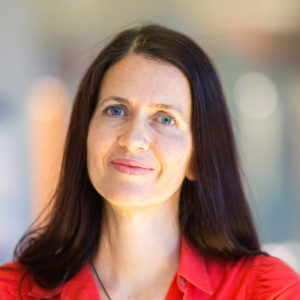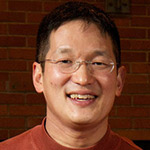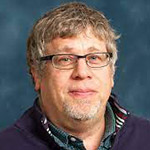Collaboration Stories
The purpose of this series is to tell the story of long-lasting, as well as emergent, stories of collaboration among clinicians and methodologists, content experts, and engineers, who have successfully worked on joint projects at the intersection of AI and health. Such collaborations are at the center of e-HAIL’s mission, and we offer these stories as a way of inspiring collaboration in other researchers.
“Be Curious About What’s Interesting to Other People”

Rada Mihalcea, Ph.D.
Janice M. Jenkins Collegiate Professor of Computer Science and Engineering
Professor of Electrical Engineering and Computer Science
College of Engineering

Larry An, M.D.
Associate Professor in Internal Medicine
Director of the Center for Health Communications Research (CHCR)

Kenneth Resnicow, Ph.D.
Professor of Health Behavior and Health Education in the School of Public Health
Associate Director for Community Engagement and Health Disparities Research at the Rogel Cancer Center
For this story, we talked to Rada Mihalcea, e-HAIL’s co-Lead convener, who has spent the past decade collaborating with clinical experts in counseling, health communication, and many other health-related fields. These collaborators include Kenneth Resnicow (School of Public Health) and Larry An (Medical School), whose perspectives and advice are also included here.
Rada Mihalcea, Kenneth Resnicow, and Larry An have collaborated on a number of different projects for nearly a decade, in different configurations of collaboration depending on the specific project. e-HAIL co-Lead Convener Rada Mihalcea is a Professor of Computer Science and Engineering and Director of the AI Lab; Larry An is an Associate Professor in Internal Medicine and Director of the Center for Health Communications Research (CHCR) at U-M. Ken Resniscow is a Professor of Health Behavior and Health Education in the School of Public Health and Associate Director for Community Engagement and Health Disparities Research at the Rogel Cancer Center. Their joint projects have focused on the use of Natural Language Processing (NLP) to improve various aspects of healthcare, ranging from counseling to doctor-patient communication to providing coping mechanisms during the early stages of the Covid pandemic.
One of the first projects Mihalcea, An, and Resnicow worked on emerged from the latter’s interest in trying to apply NLP (Natural Language Processing) to his domain of motivational interviewing. Motivational interviewing is a way to talk to patients or to do counseling, which includes reflective statements, empathy, and asking questions. Having learned about the potential relevance of NLP, Resnicow connected with Mihalcea, and soon her doctoral students were working on various projects in this domain. Resnicow recounts: “We started by doing human annotation based on existing audio recordings of interviews, coding every one of the circa six to seven thousand exchanges between the patient and the provider by category: Was that a question? Was it a reflective statement? Did it have empathy in it? Did it violate any principles of motivational intervening? The goal of this first project was to try and teach the AI agent how to recognize empathy by using machine learning, and comparing the agent’s ability to recognize empathy by comparing the human score to the machine learning score.”
Projects like this are rich in core NLP questions, Mihalcea notes, which make them attractive for PhD students and postdocs to work on. “An example of such a theoretical challenge is how you insert knowledge into the dialogue between an AI agent and a patient. Likewise, it’s an interesting core NLP problem that for a counseling tool, you want to optimize for talking less and listening more, and talking in such a way that it elicits more talk from the other.” Ultimately, says Resnicow, the goal is to take successive “baby steps towards developing an AI therapist.” So the next project focused on teaching the AI to recognize reflection statements. Such statements, in which a provider repeats the words of a patient back to them with a twist, are part of motivational interviewing. “In order to eventually create an AI tool for counselor training, the agent has to be able to predict if an utterance is a reflection, so that training advice can be tailored to the actual counselor behavior. And the next step, which is currently ongoing, is to teach the AI to generate responses, in reaction to free text utterances from patients.”
With additional projects have come additional collaborators. For the project of teaching the AI to recognize a reflective statement, they brought in research scientist Veronica Perez-Rosas. Perez-Rosas, Mihalcea, and An have also collaborated on projects in An’s field of healthcare communication. This includes a project to understand the factors that increase the spread of health-related misinformation. An explains, “For a first project, we have been trying to understand the factors that predict the spread of misinformation about Covid on different social media platforms. A follow-up project that’s currently being planned will hone in on the individual and group differences in susceptibility to misinformation.”
The history of collaborations between An, Mihalcea, Resnicow, and Perez-Rosas allowed them to pivot quickly towards a project aimed at helping people cope with the challenges posed by the early stages of the Covid pandemic. The team developed a computer dialogue agent that combined strategies of expressive writing–based on the work of James Pennebaker at the University of Texas–with some of the strategies of motivational interviewing that they’d worked on before. The resulting “expressive interviewing” tool helped people to write and think about important issues and challenges in their life, initially focused on the stress from social isolation during the first months of Covid. Results from this project found that people who interacted with the expressive interviewing program experienced reduced stress. Following this success, the team is working to develop an expressive interviewing tool for cancer patients and survivors, to help people build internal resources for addressing ongoing distress from a cancer diagnosis.
Another shared interest of Mihalcea and An, which started as a project where they were co-mentoring a PhD student through a Google Focus Award, is to use natural language processing to improve the care of cancer patients. According to An, “one of the real challenges is that cancer patients, or any patient with a serious health condition, tend to get overwhelmed with all the information they receive from their doctor during their visits. Studies show that people retain less than half the information they get during a doctor’s visit. So they leave the visit with lots of questions and then they go online to search for the answers.” The team realized that a much better way for patients to get answers to their questions right would be to search for them within the conversations they had already had with their doctor, but which they might have forgotten about. An ongoing project tries to create a searchable record of conversations between patients and their doctors, in order to better meet the information needs of cancer patients, and help them find better answers to their questions.
Based on almost a decade’s worth of collaboration on these and other projects, Mihalcea, An, and Resnicow offer valuable insight into what makes such long-standing and wide-ranging collaborations work. Mihalcea stresses the importance of open-mindedness and notes that “how you think about a problem differs by discipline. Imposter system is real in collaborative projects, but you need to just reach out to people: how else are you going to know if they’re interested in a specific topic?” An adds that you should take the time to “understand what’s interesting to other people. Because you already know what’s interesting to you. So understanding what others are interested in is where and how you find your shared projects.” Some of the lessons learned go beyond the professional realm. Says Mihalcea: “One of the things I’ve learned is how to be more empathetic and to communicate with people in a way that works for them, which is also useful to me as a human being, in interacting with family and friends.”
All three agree that multidisciplinary collaboration is critical in order to make progress on any complex research question, particularly in the health domain. “These challenges are complex and difficult, and if they could be solved by a single smart person, they would already have been solved,” says An. Mihalcea appreciates that “clinicians keep us in check by making sure that we are solving the right problems, which will actually allow us to have an impact.” Resnicow highlights how the breadth and depth of research being done at U-M allows research to accelerate at a faster pace through collaborations that tap into existing expertise. In the course of working with NLP experts, he has been struck by how quickly they have been able to apply their tools to new contexts. He sees room for growth to more fully take advantage of the advances in NLP and put U-M on the map for being a leader in this research area.

 MENU
MENU 
